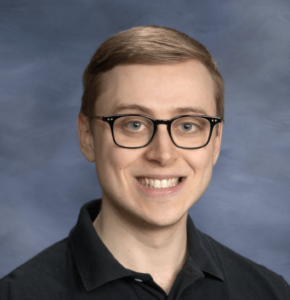David Bobrowski – Studentship – 2017
David Bobrowski is an Undergraduate Science Student at McMaster University
David’s project has been generously supported by a gift from the Taite Boomer Foundation
About the research
Project title: “Co-expression of EphA2 &A3 Receptor Tyrosine Kinases Mark Brain Tumour Initiating Cell Population in Recurrent Human Glioblastoma”
Glioblastoma (GBM), a highly malignant astrocytic tumour, remains incurable with a median survival of 15 months. GBM cells demonstrate significant heterogeneity in their tumour-forming ability, suggesting that only a subpopulation of stem-like cancer cells, termed brain tumour initiating cells (BTICs), drive tumour formation and progression. Hence, the identification of BTIC-specific markers, the isolation and characterisation of BTICs from cancerous tissues, and targeting strategies to eliminate BTICs provides a promising opportunity for cancer research and treatment. Many of the 14 members of the erythropoietin-producing hepatocellular carcinoma (Eph) receptor family are expressed in GBM cells and are increasingly recognized as attractive therapeutic targets. To be specific, Eph receptors may play cooperative roles in modulating signaling pathways in GBM. In this study, we aim to demonstrate that the co-expression of the EphA2 and EphA3 receptors marks a BTIC population in human recurrent GBM and to further elucidate the intracellular signaling pathways of these molecules. To assess these properties, stem cell assays, protein assays, and animal models will be employed. Despite the challenges presented by the biology of the Eph system, this line of investigation offers novel therapeutic opportunities with the prospect of improved patient outcomes through the selective targeting of BTICs.
About David, in his own words…
 Research Student – David Bobrowski Undergraduate Science Student, McMaster University It has been said that tears come from the heart, and not the brain, but it is the brain that makes each human being unique. Neuro-oncology is the bridge between neuroscience and oncology providing bench to bedside personalized care to each patient with a central nervous system tumour.
Research Student – David Bobrowski Undergraduate Science Student, McMaster University It has been said that tears come from the heart, and not the brain, but it is the brain that makes each human being unique. Neuro-oncology is the bridge between neuroscience and oncology providing bench to bedside personalized care to each patient with a central nervous system tumour.
Being awarded a Brain Tumour Research Studentship provides students like me with the opportunity to conduct our own research and make a contribution that might alleviate suffering. Specifically, this Scholarship will provide me with the opportunity to consolidate my theoretical knowledge and prior research experience, and define the technical skills fundamental to competency in scientific inquiry.
As a student dedicated to the ultimate goal of a service-oriented career in the health sciences, I can think of no greater gift than the unique learning opportunity offered through this studentship program. It is from this perspective that I sincerely thank Brain Tumour Foundation of Canada, its benefactors, and the patients who donate their tumour samples for furthering our understanding of brain cancers.
Progress Report
Over the duration of the summer, I had the privilege to work at the McMaster Stem Cell and Cancer Research Institute (SCC-RI) in Hamilton under the supervision of Dr. Sheila Singh. In applying a stem cell biology framework to the study of brain tumours, the Singh laboratory has identified and purified a subpopulation of cells, termed brain tumour initiating cells (BTICs), from human glioblastoma (GBM) tissue samples which exhibit stem cell properties, namely self-renewal, in both culture and animal models. BTICs are thought to be responsible for cancer initiation, progression, recurrence, and drug resistance. The BTIC hypothesis has gained a great deal of attention over the past several years because these cellular changes raise the potential for the development of novel therapies. Treatment interventions can take advantage of a perceived Achilles’ heel by targeting cell-surface molecular markers or various intracellular signaling pathways involved in regulating these special properties of the BTIC population likely responsible for poor patient outcomes. This approach represents a paradigm shift from treating the manifestations of cancer to addressing the cause. Read the full progress report….
Progress Update
David did not participate in second summer, due to beginning Medical School sooner than anticipated.